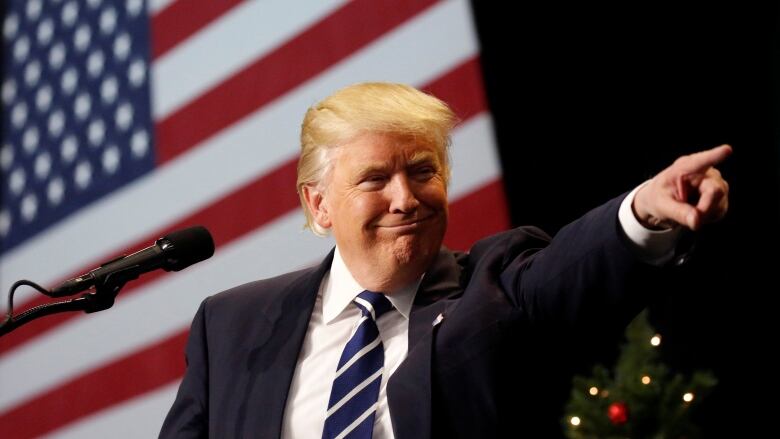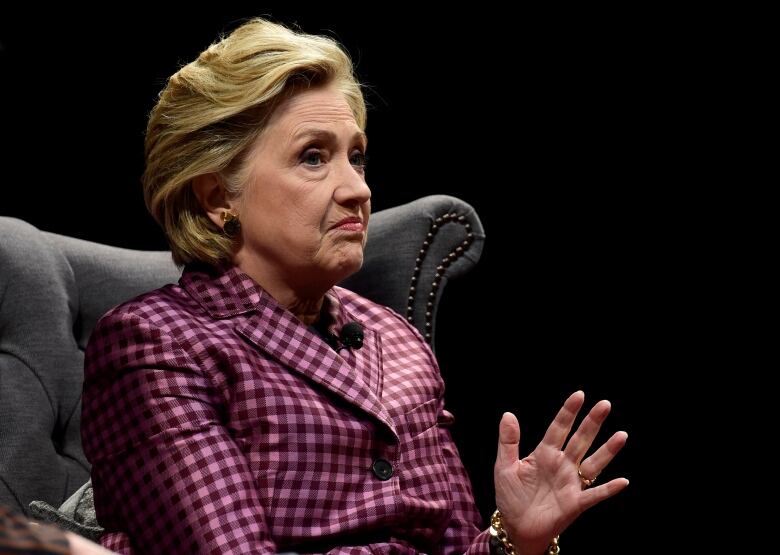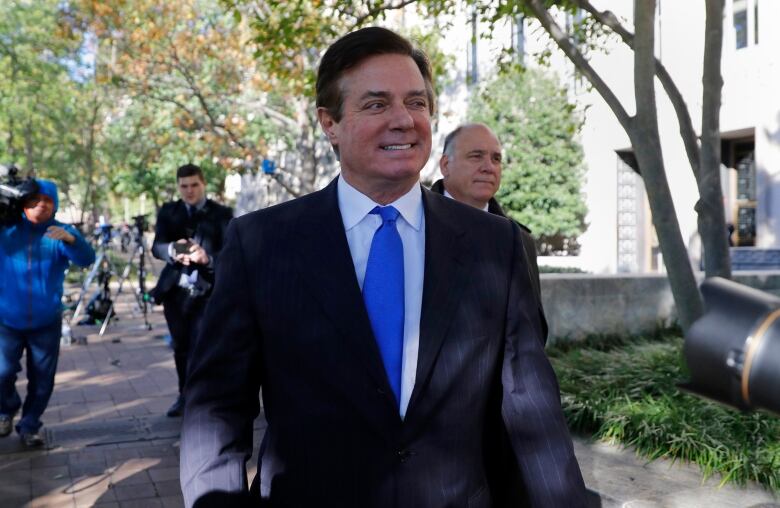Trump is hyping a uranium scandal about Hillary Clinton. Here's why some observers call it 'bogus'
Complex tale about 2010 Uranium One deal revived as Trump camp fends off Mueller probe

U.S. President Donald Trump keeps dishing about the Russia collusion scandal.
No, not that scandal.
The one that purportedly, but not actually, involves his former political rival Hillary Clinton; that concerned House Republicans enough to launch a probe; and that's now being fanned by right-wing media at a time when the White House is feeling heat from the Trump-Russia investigation.
The president's discredited allegations, which link Clinton to a bribery case and an Obama-era uranium deal, come after freshindictments of Trump campaign associates.
Those charges resulted this week from special counsel Robert Mueller's investigation into Russian interference in the election.

But what Trump calls a "modern-age" Watergate a conspiracy theory that Clinton accepted bribes in exchange for allowing Russia's nuclear agencyto claim American uranium is unfounded, Russia and nuclear experts say.
It concerns what they consider an innocuous deal: The partial sale in 2010 of Uranium One a Canadian company based in Toronto that happens to have mining rights in the U.S. to Russia's nuclear authority Rosatom.
"The short answer is no, there's nothing particularly unusual about it," says ThomasGraham, a former national security adviser in Barack Obama's White House.
Trump described the Uranium One transaction quite differently.
"We had Hillary Clinton give Russia 20 per cent of the uranium in our country," he said in February. "You know what uranium is, right? It's this thing called nuclear weapons."
Wrong in so many ways, Graham says.
Uranium for reactors,notnuclear fuel
To begin with, the uranium was for commercial use in reactors. In fact, Graham says, "the United States has no way to turn uranium into nuclear fuel for weapons."
What's more, Clinton was, by all accounts, never directly involved in the foreign transfer of that company while she was secretary of state.

Instead, Graham says, a State Department underling would have sat at the table representing one of nine agencies on the committee on foreigninvestment in the United States to review the deal to ensure it didn't compromise national security.
"The decision-making in these cases is delegated to somebody else at a lower level, not the cabinet secretary."
And Graham notes that Trump's "20 per cent" estimate refers to domestic production capacity, not the American supply of produced uranium.
The distinction has been lost on some conservative pundits. On Fox News, hostTucker Carlson questionedwhether it was wiseto "give" Russia 20 per cent "of our uranium supplies."
Compared to uranium-mining powerhouses worldwide, though, the U.S. is a small-time player. Prominent nuclear policy analyst Frank Von Hippel, a former assistant national security director in the Clinton administration, says the U.S. represents less than three per cent of global uranium production. By comparison, he estimates Canada accounts for more than 15 per cent.
"So this whole thing," Von Hippel says, "it's just a political tempestin the teapot, as far as I'm concerned. It has nothing to do with national security. It's a completely bogus issue."
Exporting uranium requires a licence
Even if the Russians wanted to do something with the relatively small amounts of U.S.-produced uranium, they wouldn't be able to export any of it outside the U.S., anyway. That's because they don't have an export licence from the Nuclear Regulatory Commission.
Asked why, in that case, Rosatom would want a controlling stake of Uranium One, Von Hippel pointed to the firm's mining rights in Kazakhstan, the world's top uranium producer, as well as in Canada.
"That would probably be of much greater interest."
The Uranium One transaction nevertheless became a scary-sounding mainstay of Trump's campaign rallies last year.
Recently, the president resurrected the myth.

The revived rumours were stoked by an article in the Hill. The politically focused newspaper reported on Oct. 17 that before the Obama administration approved the deal, the FBI dug up evidence of bribery, extortion, money laundering and kickbacks involving Russian nuclear officials.
That's a legitimate but separate story. The problem with the Clinton allegations, critics say, is it conjures a cover-up from facts that have no proof of any connection.
The story pushed by Breitbart News editor-at-large Peter Schweizer in his book Clinton Cash strings together a timeline in which Bill Clinton accepted $500,000 for a 2010 speech in Moscow. He refers toa 2015New York Times article, which reported that the speechwas paid for by aRussian investment bank thathadlinks to the Kremlinand was promoting Uranium One stock.
Trump and other Republicans have charged that donations by Uranium One investorsto the Clinton Foundation totalled $145 million.
And although the primary donor, Canadian Frank Giustra, previously owned shares in Uranium One, he sold his stake three years before the Russia deal, in2007. The Times and Breitbart also reporteddonations between 2009 and 2013 by Canadian mining executive Ian Telfer, who waschairofUranium One at the time, adding up to$2.35 million.
But suggesting that means Clinton took bribes from Russian nuclear officials is "complete B.S.," says Michael Campbell, a Texas-based geologist and expert on uranium exploration with the independent mining consultancyI2M.
"There wasn't anything about quid pro. This business about the Clintons getting money for speeches, that was so different. The timing was even separate. So separate you could see there was no relationship."
Republicans will investigate the deal
Congressional Republicans say they're suspicious. Republican Devin Nunes, chairman of the House intelligence committee, announced a probe last month into the 2010 uranium deal. And on Friday, Florida congressman Matt Gaetz demanded Mueller's removal from the Trump-Russia probe, reasoning that he led the FBI at the time of the deal. (Gaetz told The Washington Post he doubts his effort to bounce Mueller will go far.)
Renewed conservative attention on the Uranium One story provoked reactionfrom the likes of Fox News's Sean Hannity. The conservative TV host told viewers this week to put aside the fresh indictments of former top Trump campaign officials to focus on "what matters."
"What did they know about the Uranium One scandal?" he asked.
Trump promoted the conspiracy further on Sunday, tweeting about the "Uranium to Russia deal," a day before his former campaign manager Paul Manafort and his business associate Richard Gates turned themselves in to the FBI.
Partisanship, Propaganda, and Disinformation:Media and the 2016 U.S. Presidential Election @mcuban @peterschweizer https://t.co/jpZkJ9q2Ay
—@Frank_GiustraBannon ,Schweitzer Breitbart, Fox,framed a story so attractive for mainstream media to cover,caused voters to doubt Clintons integrity."
—@Frank_GiustraUranium deal to Russia, with Clinton help and Obama Administration knowledge, is the biggest story that Fake Media doesn't want to follow!
—@realDonaldTrumpCampbell noted the foreign transfer of Uranium One happened "when things were about playing nice," a time when the U.S. was seeking to "reset" its relationship with Russia.
As for the timing for Trump to redeploy this story, that also makes sense to Campbell.
"The White House needed something distractible from its current problems that also involved the Russians," he says. "This was ready-made."












_(720p).jpg)


 OFFICIAL HD MUSIC VIDEO.jpg)
.jpg)



























































































